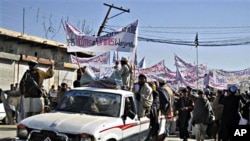Pakistan has pulled out of trilateral talks with the United States on Afghanistan to protest a deadly U.S. drone attack in a remote border region. The incident comes at a time when relations between Islamabad and Washington are already strained.
The United States has stepped up missile strikes by unmanned planes on militant hideouts in Pakistan's tribal region in recent months. But this latest drone attack in North Waziristan is one of the deadliest and reportedly killed civilians.
Pakistani officials and tribal sources say that Thursday's attack in the Datta Khel area targeted tribesmen who had gathered for a traditional jirga meeting to settle an internal dispute.
The country's political and military leaders have condemned the strike. Pakistan's army chief, General Ashfaq Pervez Kayani, on Thursday said the jirga was targeted "callously with complete disregard to human life".
A day later, the Pakistan's foreign office summoned U.S. Ambassador Cameron Munter to formally protest the deadly attack.
"Ambassador Munter has categorically conveyed that such strikes were not only unacceptable, but also constituted a flagrant violation of humanitarian norms and law," said Janjua. "It was also stated that if for the White House and the State Department to hold back those who have been trying to veer Pakistan-US relationship away from the track," said Foreign office spokeswoman Tehmina Janjua.
She was apparently referring to the CIA that many believe runs the drone operation. U.S officials do not publicly comment on the drone attacks, but privately describe them as an effective tool against al-Qaida-led terrorists. It is widely believed that Pakistani authorities are providing intelligence information for the strikes.
Spokeswoman Janjua says that following the drone attack Pakistan has decided not to attend a proposed trilateral meeting of Afghan, U.S. and Pakistani officials next week in Brussels. The talks were to focus on security and peace efforts in Afghanistan.
This is the second time the trilateral dialogue has been suspended.
Washington postponed the talks after CIA contractor Raymond Davis was detained in late January for shooting and killed two Pakistanis in the eastern city of Lahore.
Davis was indicted on double murder charges but a settlement agreement with relatives of the victims led to his release on Wednesday.
The United States maintained throughout the seven-week standoff with Pakistan that Davis has diplomatic immunity. But Pakistani authorities disagreed and left it for the country's court to determine his fate.
Davis' release on Wednesday sparked protests by religious and right-wing parties, who say Pakistan's civilian and military leaders bowed to U.S pressure. Protests have been held across Pakistan this week, with demonstrators again taking to the streets following Friday prayers.
Analysts suggest the army leadership's rare condemnation of Thursday's drone attack could have been meant to deflect criticism of the Pakistani intelligence agency's perceived role in securing the release of the CIA contractor. Hassan Askari Rizvi is a former professor at Punjab University.
"Perhaps, the reason being the army wants to demonstrate to the people that it is not really conceding everything to the American policies in the region," said Rizvi. "So maybe it is because of the domestic pressure that was mounting on the army that the army decided to take up this position."
Prime Minister Yousuf Raza Gilani responded to critics Friday, saying the government simply implemented the court order to free Davis. Therefore, in his words, it is inappropriate to hold any single institution responsible for the final outcome of the case.




